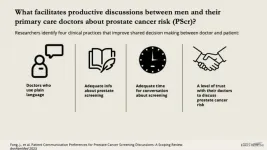(Press-News.org) The proportion of people dying before their time (under the age of 75) is set to rise by nearly 6.5%---30 extra deaths/100,000 of the population annually—with those in the most deprived households experiencing a rate 4 times that of the least deprived.
In recent years, the UK has experienced levels of inflation not seen since the 1970s as a result of the war in Ukraine, COVID-19, Brexit and fiscal policy, note the researchers. Poorer households have borne the brunt as they spend a larger proportion of their income on energy, the cost of which has soared.
In a bid to mitigate the impact, the UK government introduced a universal Energy Price Guarantee (EPG) and a series of more targeted Cost of Living Support payments for the poorest households.
The evidence consistently shows that low income is associated with poorer health, and long term studies have shown that falls in income adversely affect health. The researchers therefore wanted to assess the impact of inflation on death rates in Scotland in 2022-3, with and without mitigating measures.
They used scenario modelling—a mathematical technique that envisages a range of potential futures, rather than just one----to estimate how: recent high inflation would affect household incomes; mitigation measures would modify these effects; death rates/life expectancy and inequalities in these would change as a result.
They modelled three scenarios: (1) without any mitigating measures; (2) with the inclusion of the EPG; and (3) with the inclusion of the EPG + Cost of Living Support payments. These were compared against ‘business as usual’ (average inflation from previous years) to estimate the health effects of each one.
Their estimates showed that without mitigating measures, inflation in October 2022 would have ranged from just under 15% in the wealthiest households to just under 23% in the poorest. The EPG scenario reduced this to between 11.7% and 15.7%, respectively.
Whatever the scenario modelled, in absolute terms real income reductions would be higher for households in less deprived areas than in more deprived areas. But households in the most deprived areas would be hardest hit in relative terms, even with government support, and would be expected to be £1400 worse off in 2022-3.
Similarly, the researchers estimated large increases in deaths resulting from the real term reduction in incomes for each of the scenarios modelled.
Without any mitigation, inflation could increase deaths by 5% in the least deprived areas and by 23% in the most deprived. The EPG scenario would lower these to between 3% and 16%, and the addition of the Cost of Living Support would cut these to between 2% and 8%.
The average increase in premature deaths for the unmitigated scenario would be 16% higher than before inflationary pressures started. But the rate would be much higher in the most deprived areas, with 192 more annual premature deaths per 100,000 of the population compared with 11 more in the least deprived.
While the other two mitigating scenarios reduced these figures, the most deprived areas were still predicted to experience an increase around 4 times that of the least deprived: 8% vs 2%, resulting in 68 more premature deaths/100,000 population vs 6 more.
Overall life expectancy would also fall in each of the three scenarios modelled: by just over 2% (1.6 years); by 1.4% (1.1 years); and by 0.9% (0.7 years). But in each case, larger reductions in life expectancy were predicted in the most deprived areas, ranging from from 2.7 years (3.7%) in the unmitigated scenario to 1 year (1.4%) in the scenario including both the EPG and Cost of Living Support payments.
The researchers then used validated measures to estimate absolute and relative inequality between the most and the least deprived sectors of the population.
Before the cost of living crisis, the absolute inequality gap was 713 additional premature deaths/100,000 population every year and 13 fewer years of life expectancy. Similarly, relative inequality was also high: the rate of premature deaths among the most deprived was 77% higher than the population average, and life expectancy 8% lower.
The ‘unmitigated’ scenario would greatly widen this gap, with absolute inequality rising by 30% for premature deaths and by 21% for life expectancy; relative inequality would rise by 12% and 23%, respectively. While the mitigating scenarios would curb this, both absolute and relative inequalities would still widen.
The researchers acknowledge certain limitations to their modelling. For example, their price inflation estimates didn’t include the costs associated with owning, maintaining, and living in one’s own home or other factors affecting household expenditure.
The modelling also assumed uniform wage inflation even though this differs between the public and private sectors, nor was it able to account for individuals’ responses to rising costs, such as working longer hours or reducing energy consumption. Effects of recession, austerity, or unemployment may also be influential.
But they point out: “Our analysis contributes to evidence that the economy matters for population health. Evidence suggests that since 2012, economic conditions in the UK have caused a stalling of life expectancy and widened health inequalities, as austerity led to weaker social security and reduced income for the poorest households.”
And they caution that while their modelling applies specifically to Scotland, “similar effects are likely across the UK as we have modelled the impact of UK government measures.”
They conclude: “The mortality impacts of inflation and real-terms income reduction are likely to be large and negative, with marked inequalities in how these are experienced. Implemented public policy responses are not sufficient to protect health and prevent widening inequalities.”
END
Cost of living crisis set to cut UK lives short and significantly widen wealth-health gap
Early deaths set to rise by nearly 6.5%, modelling suggests. Rate for those in most deprived households 4 times that of least deprived
2023-09-26
ELSE PRESS RELEASES FROM THIS DATE:
Flawed body of research indicates true ‘long COVID’ risk likely exaggerated
2023-09-26
Overly broad definitions, a lack of appropriate, or any, comparison groups, among other things, in studies looking at the incidence, prevalence, and control of the condition—epidemiology—have distorted the risks, say the researchers.
This is further compounded by inclusion of poorly conducted studies into systematic reviews and pooled data analyses that end up overstating the risk yet again, they add.
The likely consequences of this include, but aren’t limited to, increased public anxiety and healthcare spend; misdiagnoses; ...
Wealthier kids in UK may have experienced steepest fall in mental health during pandemic
2023-09-26
The findings confound predictions in some quarters that disadvantaged children, who had worse mental health to start with, would be hardest hit. But even if child mental health has become more equal, it worsened, overall, following the pandemic, emphasise the researchers.
There is some evidence that declines in mental health during the COVID-19 pandemic may have been greatest among younger people, say the researchers, but the impact on inequalities in child mental health isn’t clear.
To explore this further, they analysed 16,361 parental observations of 9272 children in the nationally ...
Stem cell therapy can safely slow progression of relapsing-remitting MS
2023-09-26
Autologous haematopoietic stem cell transplantation, or aHSCT for short, is usually used to treat blood cancers, and involves harvesting stem cells from the person’s own bone marrow or blood followed by chemotherapy and antibody treatment.
Emerging evidence indicates that it is suitable for treating relapsing-remitting MS— characterised by distinct inflammatory episodes that cause varying degrees of residual disability. But aHSCT has yet to be included in most national clinical guidelines.
The researchers therefore ...
NASA’s Interstellar Mapping and Acceleration Probe passes system integration review
2023-09-26
The Interstellar Mapping and Acceleration Probe (IMAP) marked the completion of an important step on the path to spacecraft assembly, test, and launch operations this week at Johns Hopkins Applied Physics Laboratory (APL) in Maryland.
The IMAP team met with a review panel to evaluate the plan for integrating all systems onto the spacecraft, such as the scientific instrumentation, electrical and communication systems, and navigation systems. Successful completion of this System Integration Review (SIR) means that the project can proceed with assembling and testing the spacecraft in preparation ...
National Science Foundation taps Worcester Polytechnic Institute fire protection expertise and resources for the Wildfire Interdisciplinary Research Center
2023-09-26
Over the past 22 years, wildfires in the United States have caused damages exceeding $100 billion, and as climate change continues to intensify wildfire frequency and severity, research is essential to protect lives, property, and ecosystems—and to help communities adapt to these changing conditions. To this end, the National Science Foundation (NSF) has added Worcester Polytechnic Institute (WPI) to its Wildfire Interdisciplinary Research Center (WIRC), a collaboration between universities and industry. Supported by a three-year, $450,000 grant with additional direct funding from industry partners, WPI will build upon its longstanding expertise ...
Doctor and pharmacist revamp standard processes for ordering and documenting mifepristone use
2023-09-25
Doctor and Pharmacist Revamp Standard Processes for Ordering and Documenting Mifepristone Use
Clinical researchers at the University of Minnesota Medical School partnered with the university health system’s compliance department to create standard processes for ordering and documenting mifepristone administration, which adhere to the Risk Evaluation and Mitigation Strategy (REMS) requirements. They established a single prescriber account to represent all system prescribers who met REMS requirements, ...
Screening for adverse childhood experience can improve trauma-informed care, though time constraints and limited referral resources present challenges
2023-09-25
Screening for Adverse Childhood Experience Can Improve Trauma-Informed Care, Though Time Constraints and Limited Referral Resources Present Challenges
Researchers conducted a qualitative evaluation in five clinics in Los Angeles County to understand physician and clinical staff perspectives on the implementation of routine Adverse Childhood Experience (ACE) screening in pediatric primary care. The researchers employed focus group discussions with 125 clinic staff involved in ACE screening, including frontline staff who administer ...
Understanding parents’ care expectations for a child with gastroenteritis could prevent after-hours care requests
2023-09-25
Understanding Parents’ Care Expectations for a Child With Gastroenteritis Could Prevent After-Hours Care Requests
Researchers from the Netherlands conducted a qualitative study to explore parental motivations, expectations, and experiences of off-hours primary care contacts for children with acute gastroenteritis. They conducted 14 semistructured interviews with parents who contacted primary care physicians outside of normal operating hours seeking medical attention for their children. Parents were more likely to contact their primary care physician after hours when their ...
Learning collaborative promotes mifepristone education and utilization training in federally qualified health centers
2023-09-25
Learning Collaborative Promotes Mifepristone Education and Utilization Training in Federally Qualified Health Centers
Researchers created a learning collaborative that included implementing an intervention titled, “Excellence in Providing Access to New Directions in Mifepristone Use (ExPAND Mifepristone)” in two Chicago-area Federally Qualified Health Centers with a focus on enhancing educational and training support services for primary care doctors and staff to use mifepristone for miscarriage management and abortion provision.
Prior to program implementation, clinicians and staff had little knowledge of mifepristone. After program ...
Men who trust their doctors, receive adequate time and general information about prostate cancer screening are more likely to have productive discussions
2023-09-25
Men Who Trust Their Doctors, Receive Adequate Time and General Information About Prostate Cancer Screening Are More Likely to Have Productive Discussions
Members of the University of Ottawa Department of Family Medicine conducted a scoping review to understand men’s communication preferences when they discuss prostate cancer screening with their doctors. Researchers analyzed a total of 29 studies and identified four main themes: men preferred that their doctors use everyday language; men wanted more information; men wanted the doctor to spend adequate time with them to explain prostate cancer; and desired a trusting and respectful relationship with their doctor. Three additional themes ...
LAST 30 PRESS RELEASES:
Kidney cancer study finds belzutifan plus pembrolizumab post-surgery helps patients at high risk for relapse stay cancer-free longer
Alkali cation effects in electrochemical carbon dioxide reduction
Test platforms for charging wireless cars now fit on a bench
$3 million NIH grant funds national study of Medicare Advantage’s benefit expansion into social supports
Amplified Sciences achieves CAP accreditation for cutting-edge diagnostic lab
Fred Hutch announces 12 recipients of the annual Harold M. Weintraub Graduate Student Award
Native forest litter helps rebuild soil life in post-mining landscapes
Mountain soils in arid regions may emit more greenhouse gas as climate shifts, new study finds
Pairing biochar with other soil amendments could unlock stronger gains in soil health
Why do we get a skip in our step when we’re happy? Thank dopamine
UC Irvine scientists uncover cellular mechanism behind muscle repair
Platform to map living brain noninvasively takes next big step
Stress-testing the Cascadia Subduction Zone reveals variability that could impact how earthquakes spread
We may be underestimating the true carbon cost of northern wildfires
Blood test predicts which bladder cancer patients may safely skip surgery
Kennesaw State's Vijay Anand honored as National Academy of Inventors Senior Member
Recovery from whaling reveals the role of age in Humpback reproduction
Can the canny tick help prevent disease like MS and cancer?
Newcomer children show lower rates of emergency department use for non‑urgent conditions, study finds
Cognitive and neuropsychiatric function in former American football players
From trash to climate tech: rubber gloves find new life as carbon capturers materials
A step towards needed treatments for hantaviruses in new molecular map
Boys are more motivated, while girls are more compassionate?
Study identifies opposing roles for IL6 and IL6R in long-term mortality
AI accurately spots medical disorder from privacy-conscious hand images
Transient Pauli blocking for broadband ultrafast optical switching
Political polarization can spur CO2 emissions, stymie climate action
Researchers develop new strategy for improving inverted perovskite solar cells
Yes! The role of YAP and CTGF as potential therapeutic targets for preventing severe liver disease
Pancreatic cancer may begin hiding from the immune system earlier than we thought
[Press-News.org] Cost of living crisis set to cut UK lives short and significantly widen wealth-health gapEarly deaths set to rise by nearly 6.5%, modelling suggests. Rate for those in most deprived households 4 times that of least deprived


